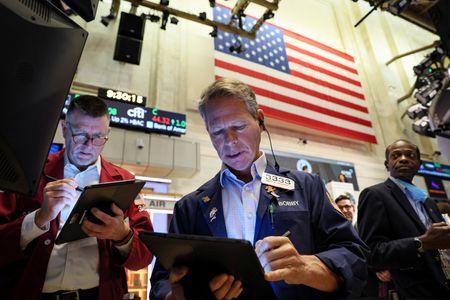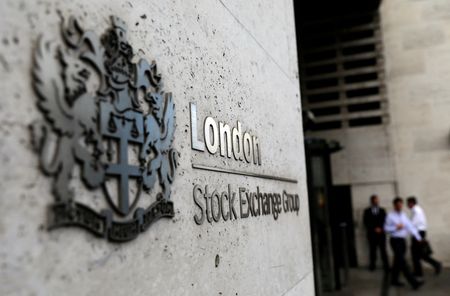By Stephen Culp
NEW YORK (Reuters) – U.S. stocks ended the session lower and benchmark Treasury yields continued their ascent on Thursday after investors weighed generally upbeat earnings against the prospect that the Federal Reserve could hold firm on its aggressive policy for longer than they had hoped.
All three major U.S. stock indexes reversed an earlier rally, turning red after remarks from Philadelphia Federal Reserve President Patrick Harker suggested the central bank will “keep raising rates for a while.”
Harker’s comments also helped support the 10-year Treasury yield’s climb past 14-year highs.
“We’ve seen wild U-turns so far this October, so the move today is par for the course,” said Ryan Detrick, chief market strategist at Carson Group in Omaha. “Harper’s comments provided further confirmation that the Fed is all in on continued aggressive policy and future (interest) rate increases.”
Financial markets have now fully priced in yet another 75 basis point interest rate hike from the Federal Reserve when it meets next month, according to CME’s FedWatch tool.
A spate of mixed quarterly corporate results and economic indicators provided some evidence of economic slowdown, but a dip in jobless claims showed the Fed’s aggressive campaign of interest rate hikes has so far had minimal effect on the tight U.S. labor market.
“Overall, earnings have been positive,” Detrick said, adding that the reporting season so far is “still suggesting we are likely not in a recession and the economy is still moving forward, just a little slower that we’d like.”
The Dow Jones Industrial Average fell 90.22 points, or 0.3%, to 30,333.59, the S&P 500 lost 29.38 points, or 0.80%, to 3,665.78 and the Nasdaq Composite dropped 65.66 points, or 0.61%, to 10,614.84.
European stocks closed higher after British Prime Minister Liz Truss announced she would resign next week, capping a brief six-week tenure marked by turmoil caused by a poorly received economic policy.
The pan-European STOXX 600 index rose 0.26% and MSCI’s gauge of stocks across the globe shed 0.56%.
Emerging market stocks lost 0.23%. MSCI’s broadest index of Asia-Pacific shares outside Japan closed 0.68% lower, while Japan’s Nikkei lost 0.92%.
Benchmark Treasury yields resumed their rise after economic data appeared to confirm the Fed is unlikely to relent in its aggressive campaign to rein in inflation.
Benchmark 10-year notes last fell 25/32 in price to yield 4.2346%, from 4.129% late on Wednesday.
The 30-year bond fell 49/32 in price to yield 4.231%, from 4.127% late on Wednesday.
The greenback was last nominally lower against a basket of foreign currencies as sterling gained.
Market participants were on alert for Japanese intervention in the yen, which briefly moved beyond the 150 per dollar level for the first time since August 1990.
The dollar index fell 0.09%, with the euro up 0.1% to $0.9781.
The Japanese yen weakened 0.18% to 150.18 per dollar, while Sterling was last trading at $1.1221, up 0.06% on the day.
Oil prices were nearly unchanged as signs of tightening supply were counterbalanced by news of that China is considering easing COVID restrictions.
U.S. crude edged up 0.5% to settle at $85.98 per barrel, while Brent settled at $92.38 per barrel, down 0.3% on the day.
Gold reversed early gains and was last nominally lower rising Treasury yields pulled the safe haven metal back near three-week lows.
Spot gold dropped 0.1% to $1,627.19 an ounce.
(Reporting by Stephen Culp; additional reporting by Huw Jones in London; Editing by Kirsten Donovan, Lisa Shumaker and David Gregorio)


